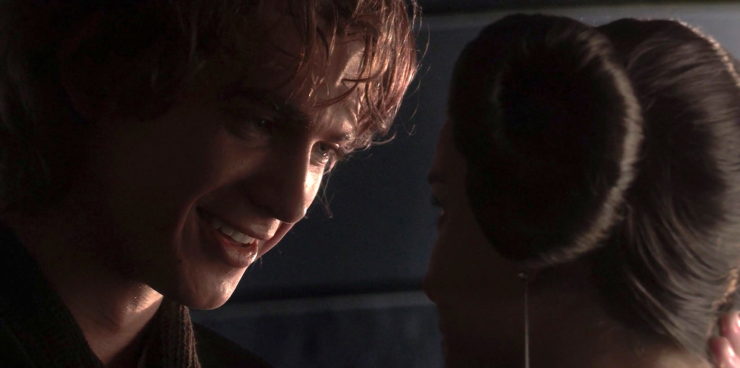The Skywalker Saga is nine whole films long, and spans three generations. It was hoped that the final installment would find aspects to tie all three trilogies together, and it succeeded in a multitude of ways, though the most interesting one was certainly unexpected.
It has to do with Revenge of the Sith.
[Spoilers for The Rise of Skywalker.]
Episode III details that fall of Anakin Skywalker and his turn to the dark side, as well as the decimation of the Jedi Order. As the Clone War comes to an end, Anakin learns that his wife Padmé is pregnant and begins having nightmares about her demise in childbirth. Having already lost his mother, he is willing to try anything that might prevent this future, and the death of someone else that he loves. Chancellor Palpatine (secretly Darth Sidious) exploits these fears in Anakin, turning him against the Jedi, his own best friend and mentor, Obi-Wan Kenobi, and eventually even Padmé herself. And through this entire debacle, there is one problem, one niggling mistake that crops up again and again between all the relevant players.
No one talks to each other.

Or perhaps it’s more accurate to say that no one is honest and open with each other. The breakdown of communication that happens in Revenge of the Sith is exacerbated by the fact that trust is failing between all the participants, and has been for so long that no one knows how to fix the problem. Anakin lies to Padmé about his excitement when she tells him she’s pregnant—he’s clearly panicking, but doesn’t want to admit as much. He tries to talk to Yoda about his fear over losing her, but he can’t tell Yoda about his marriage (due to the rules the Order has against “attachments” to others), so Yoda’s advice on the matter is hollow, even cruel. He’s asked to spy on the Jedi by Palpatine, then asked to spy on Palpatine by the Jedi. He’s put in a position of power as a member of the Jedi Council, but only because the Emperor demands it—so all the respect that would normally come with such a position is non-existent.
The Jedi send Obi-Wan away to deal with General Grievous, which conveniently robs Anakin of the one person he might consider talking to about his fears. He’s left with his wife (who he doesn’t want to terrify by being more insistent about his premonitions of doom), Mace Windu (who is plainly distrustful of him), and Chancellor Palpatine (the bad dude who wants to kill all of the Jedi and make Anakin his eternal right hand slave). Padmé knows that something is wrong, but seeing as her entire marriage was founded on lies—both to her people and to the Jedi—she doesn’t have a baseline of healthy communication with Anakin that would see them through this. All she knows is that he’s scared, and all her plans to alleviate that stress (giving birth in seclusion, insisting that she won’t die in childbirth) never get through to him.
It’s important to note that before George Lucas cut most of her scenes, Padmé’s primary subplot in the film centered around her working with Bail Organa and Mon Mothma to coordinate the very beginnings of the Rebel Alliance. A fact that she never tells Anakin about because she knows he would be against it, as the Chancellor’s Number One Guy. They come close to having this conversation when she asks Anakin if he ever wonders whether or not they might be on the wrong side of the Clone War, and his immediate response is that she’s “beginning to sound like a Separatist”. And that’s it. Padmé never tells Anakin about the work she’s doing because he’s made it clear that he considers any and all dissent treasonous. She may claim shock when Obi-Wan arrives later and tells her what Anakin has done to the Jedi, but she’s known that she can’t trust her husband for quite some time.
This complete breakdown results in perhaps the most ridiculous claim in the entirety of the prequels, where Padmé tells Anakin point blank that all she wants is his love, and he counters that “Love won’t save you, Padmé. Only my new powers can do that.” No matter how over-the-top that utterance may be, it throws the problem into sharp relief—Anakin only believes that the application of power fixes problems. Communication, trust, and support are alien to him because the Jedi have always been wary of him. By the time Obi-Wan tries to talk Anakin away from his dark path on Mustafar, Anakin is too far gone to listen.
The Rise of Skywalker surprisingly deals with many of the same issues, but course corrects in all the places where Revenge of the Sith goes wrong. From the very start of the film, we find out that our core trio—Rey, Finn, and Poe—are having trouble working together because they’re all worried that their friends are being less than honest with them. This turns out to be true, in that each of them is hiding something from the others; Poe has kept quiet about a sordid past as a spice smuggler and is struggling with his new leadership position in the Resistance; Finn is Force-sensitive and not sure how to bring it up; Rey is on a path to discovering that she might be the heir of the Sith, and has a strange connection with Kylo Ren. Rather than being upfront about their fears, they have all clearly been keeping things bottled up—this leads to Rey and Poe sniping at each other while a frustrated Finn tries to keep the peace.

The fact that they refuse to air their concerns leads to miscommunications across board. On Pasana, the group get trapped in sinking fields, and Finn blurts out to Rey that there’s something he never told her. We find out later that he’s been trying to find time to tell her about his connection to the Force, but Poe seems to think that Finn was about to confess his undying love to Rey, and is extremely miffed over it. (Because he loves Finn? Because he doesn’t want them to waste precious Resistance time on their feelings?) Later on, Poe almost doesn’t redirect the group to Kijimi because he doesn’t want them to meet any of his old smuggling buddies, learn about his history, and think differently of him. (Finn takes this knowledge in stride, and ribs him mercilessly for it, as he should.)
Once they reach the Endor system, Finn can tell that something has changed for Rey. She tries to evade his concerns, and he re-stresses that he can’t help her if she refuses to open up to him—but the revelation of Rey’s lineage proves too much for her, and she abandons the group to find answers on her own. When Finn tries to rally others to go after her, Poe’s fears over being an effective leader rear their head, and he digs his heels in. They have other work to see to, rather than chasing after their friend. He insists that he’s “not Leia”, their fearless general, and Finn gives it to him. “That’s for damn sure,” he says. What neither of them know is that Leia is about to die, removing that guiding light from their sights. And that Rey is about to disappear. Both of the people who Finn and Poe use for a sense of consistency and safety will be gone.
But Finn stills goes after Rey with his new friend Jannah to try and reach her. He never stops making it clear that he cares about her because he knows that she needs to see it. When Rey still decides that her best option is hiding herself away on Ahch-To, as Luke Skywalker did, the Jedi Master’s ghost finally makes the effort to communicate. He tells her that he was wrong to hide himself away, and that she would be too. And Rey’s first act, when she decides to heed that advice and reenter the fray? She sends a message back to her friends to light their way to the big fight.

Back at the Resistance base and faced with Leia’s death, Poe finally has to acknowledge his own fear of leading, and realizes that the answer has been in front of him the whole time—he can admit to his reservations and share that burden with Finn. They become co-generals in charge of the battle against the Final Order, and during that fight, Poe makes sure to listen to Finn and share command equally. Through their collaboration and trust in one another, the Resistance can continue to flourish.
There are moments like these embedded throughout the film to drive this point home; Finn talking to Jannah about their defections from the First Order, and him confessing his connection to the Force; the way Rose and Finn can interact fully with nothing but a look and a word; Poe’s quiet moment with Zorii, where she teaches him not to despair because he’s not alone. Poe asking Lando about how the leaders of the Rebellion managed the fight the first time around, and Lando gamely admitting they had no idea what they were doing. Hux’s traitorous communiques help the Resistance. Chewie and Lando’s plea from the core worlds bringing the greatest fighting force the Emperor has ever seen.
And most important of all, Leia’s choice to reconnect with her son, which is the only thing that makes it possible for Kylo Ren to become Ben Solo again. Opening up that line in communication is what makes Ben’s role in this story possible, from his aid of Rey against the Emperor, to his choice to give up the life force that she imbued him with in order to save her life.
This ends with the joyful sort of communication that we all expect—reunions and celebrations, people seeking out their friends and families, and a threeway hug between our valiant trio because everything they fought for and sacrificed turned out to be worth it. But only because they believed in each other, and worked to overcome their fears of being seen, even in their least heroic moments. It has been true over the course of the entire third trilogy—and even at points in the Original Trilogy—but especially true here, at the end.
The Rise of Skywalker stealthily pokes at the very problem that led to Anakin Skywalker’s fall by showing how that problem can be corrected through trust in your friends, and honesty in admitting your fears and foibles to them. It puts the arc of the entire Skywalker Saga in context, making Anakin’s failures much easier to understand. But most of all, it reminds us that the legacy of Star Wars isn’t simply about finding the light when dark seems inevitable, or defeating evil through equal measures of power—it is about answering fear and pain with an open and thoughtful heart.
Emmet Asher-Perrin had a lot of feelings about everyone’s feelings in this movie, and it resulted in a lot of crying. You can bug him on Twitter, and read more of her work here and elsewhere.










